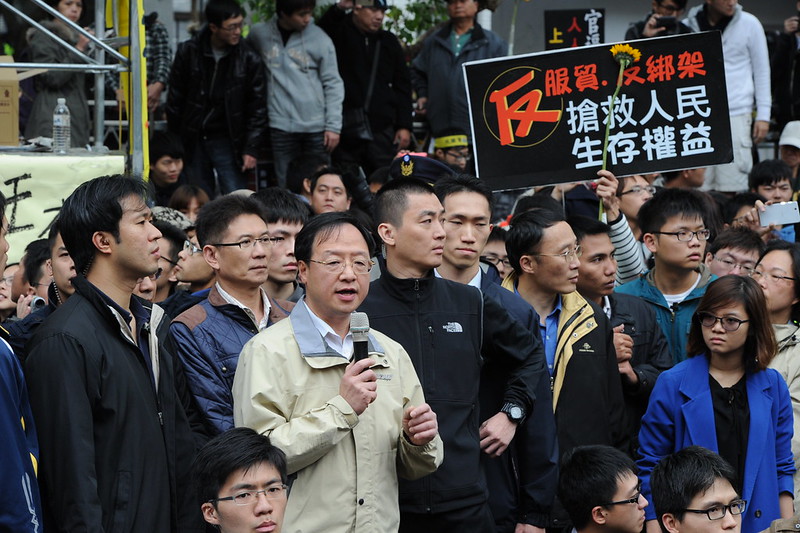Pact supporters to confront students
By Rich Chang / Staff reporter
Groups opposed to the student-led occupation of the Legislative Yuan yesterday said they would lead a rally to the legislature in Taipei to talk to the students today, with former Bamboo Union leader Chang An-le (張安樂) pledging full support for the action.
The groups include the Taiwan Labor Welfare Alliance, Taipei City General Union and representatives from various industries and unions.
Chang, known as the “White Wolf,” fled to China in 1996 and was on Taiwan’s most-wanted list for alleged violations of the Organized Crime Prevention Act (組織犯罪防制條例). He was arrested when he returned to Taiwan on June 30 last year, but was promptly released on bail.
Chang, who is also the head of the China Unification Promotion Party, said the students and some members of the public had been “misled” into thinking that the cross-strait service trade agreement would harm the interests of Taiwan.
Several media reports said Chang would lead 2,000 people in confronting the students today, but Chang said while he fully supports the groups’ move, he would not join the action.
“We will ask police to allow us to enter the legislature and go to the assembly hall. The assembly hall belongs to all people, not only students, does it not?” Taiwan Labor Welfare Alliance convener Wang Yu-wen (王裕文) said.
“We want to discuss the cross-strait service trade pact with students,” he said.
Shih Yen-ting (施彥廷), a spokesperson for the student activists, said the students are not worried.
“We hope that he [Chang] and his followers will come in peace and not create conflict,” Shih said. “If they try to force themselves in, we have built up a system to defend the legislative chamber. We have also notified the police.”
Shih added that if Chang and his followers support the students’ appeals, “we would invite them to sit down with us, but based on what we have heard so far, they seem to hold an opposite view on the issue.”
Executive Yuan spokesperson Sun Lih-chyun (孫立群) said that any civic group activity should be peaceful and rational, and any person found breaking the law would be held responsible by authorities.
The Democratic Progressive Party (DPP) and the Taiwan Solidarity Union (TSU) condemned Chang’s planned action and called on Taipei police to take precautionary measures to prevent an escalation of tensions.
The DPP has received intelligence that gangster organizations are directly involved in the planned action today and Taipei police should take the necessary measures to ensure students’ safety, DPP spokesperson Xavier Chang (張惇涵) said.
TSU Chairman Huang Kun-huei (黃昆輝) raised his concern over the gangsters’ close connections with Beijing, which he said is now openly interfering with Taiwanese public policies and affairs.
He urged fellow citizens to protect the students.
Huang also accused President Ma Ying-jeou (馬英九) of resorting to gangsters to oppress people who oppose him.
Taipei police said that officers would be deployed around the legislature today during the protest.
Meanwhile, netizens called on the public to go to the legislature to protect the students.
“Students are not like gangsters who have weapons. They are our future and they need to be protected,” a netizen named FaBie said.
“I will go to the legislature and serve as a body shield for the students. I do not carry a weapon, I don’t provoke others, but I want you to know that I am behind the students,” he wrote.

